How to Compare the Trainability of German Shepherds Vs. Belgian Shepherds
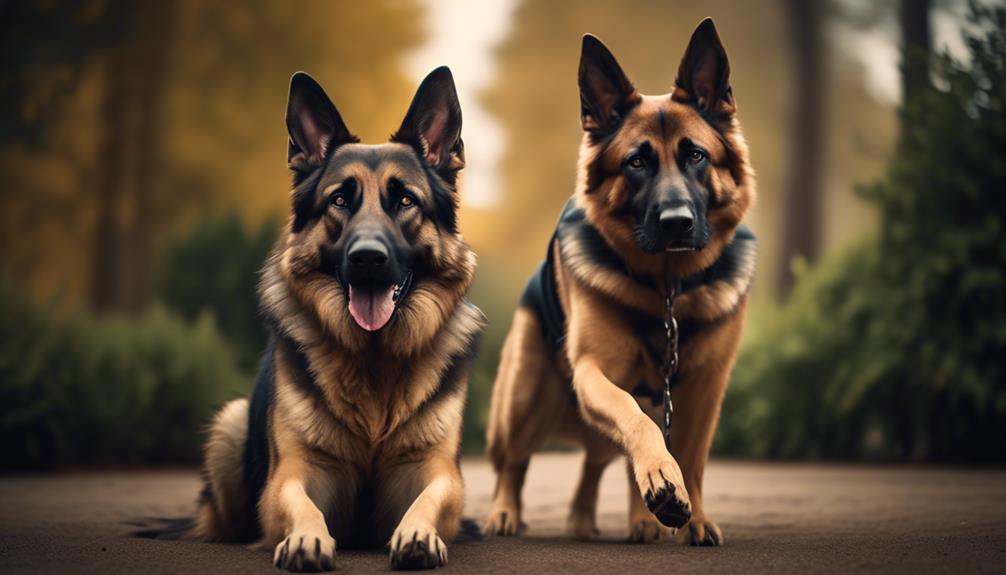
German Shepherds and Belgian Shepherds are both highly trainable breeds. However, their trainability can vary based on individual factors such as intelligence, temperament, and willingness to please.
Key Takeaways
- Both German Shepherds and Belgian Shepherds are highly intelligent and trainable, but they excel in different tasks.
- German Shepherds are more independent workers, while Belgian Shepherds thrive on routine and consistency.
- German Shepherds are well-suited for families and individuals looking for a loyal and protective companion, while Belgian Shepherds are highly energetic and agile.
- Belgian Shepherds require mental stimulation and physical exercise to maintain focus during training sessions, while German Shepherds thrive in environments with clear instructions and consistent guidance.
Intelligence of German Shepherds Vs. Belgian Shepherds
German Shepherds and Belgian Shepherds are renowned for their intelligence, making them highly trainable and adaptable breeds. When it comes to training and work, both these breeds have exceptional capabilities. However, there are some key differences in the way they excel.
German Shepherds, known for their versatility, are often used as working dogs in various fields. Their high intelligence and eagerness to please make them ideal for tasks such as search and rescue, police work, and service dog training. They possess a strong work ethic and are quick learners, making them highly suitable for complex tasks. German Shepherds have a natural ability to understand and follow commands, making them reliable and efficient partners.
On the other hand, Belgian Shepherds, including the Malinois, are also highly intelligent and energetic. While they share some similarities with German Shepherds, Belgian Shepherds have a more intense drive to work and require a significant amount of mental and physical stimulation. They're often utilized in roles such as police and military work, as well as competitive obedience and agility. Their high energy levels and focus make them excel in demanding tasks that require speed and precision.
Temperament Comparison: German Shepherds Vs. Belgian Shepherds
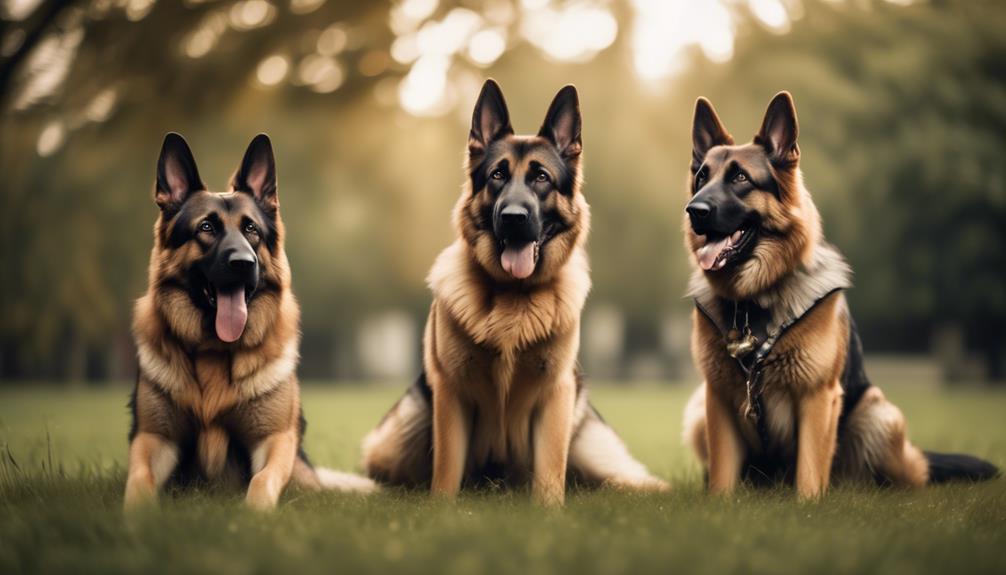
While both German Shepherds and Belgian Shepherds possess exceptional intelligence and trainability, their contrasting temperaments set them apart in terms of their suitability for various tasks and environments. Understanding the temperamental differences between these two breeds is crucial for potential owners to make an informed decision about which dog best fits their needs.
Here are three key points to consider when comparing the temperaments of German Shepherds and Belgian Shepherds:
- German Shepherds: German Shepherds are known for their loyalty, courage, and confidence. They're often used as working dogs in fields such as law enforcement and search and rescue. Their calm and composed demeanor makes them well-suited for tasks that require focus and discipline. German Shepherds are also highly protective of their family and territory, making them excellent guard dogs.
- Belgian Shepherds: Belgian Shepherds, on the other hand, are known for their energy, agility, and high drive. They're extremely versatile and excel in various dog sports such as obedience, agility, and tracking. Belgian Shepherds have a strong work ethic and thrive in challenging and stimulating environments. Their intensity and enthusiasm make them ideal for tasks that require quick thinking and athleticism.
- Suitability for Different Environments: Due to their different temperaments, German Shepherds are generally better suited for families and individuals who are looking for a loyal and protective companion. On the other hand, Belgian Shepherds are a great choice for active individuals or families who can provide them with plenty of mental and physical stimulation. They thrive in environments that offer them opportunities to work and engage their natural instincts.
Willingness to Please: German Shepherds Vs. Belgian Shepherds
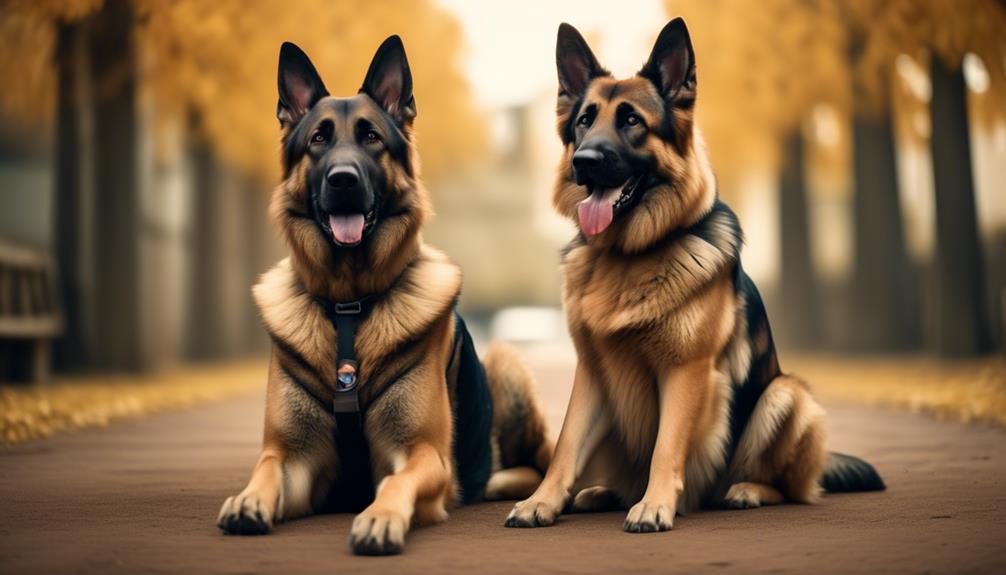
Belgian Shepherds and German Shepherds differ in their willingness to please their owners and their eagerness to work and learn. When comparing the trainability of these two breeds, it's important to consider their individual characteristics in the context of their willingness to please.
German Shepherds are known for their strong desire to please their owners. They're highly motivated by praise and rewards, which makes them eager to learn and perform tasks. Their intelligence and loyalty contribute to their willingness to work and excel in various training activities. German Shepherds thrive in environments where they're given clear instructions and consistent guidance, as they're quick to pick up new commands and behaviors.
On the other hand, Belgian Shepherds also exhibit a high level of trainability. Their willingness to please their owners is evident in their eagerness to work and their ability to learn complex tasks. These dogs have a natural drive to perform and are often used in roles such as search and rescue, police work, and service dog training. Belgian Shepherds require mental stimulation and physical exercise to channel their energy and maintain their focus during training sessions.
Trainability Factors: German Shepherds Vs. Belgian Shepherds
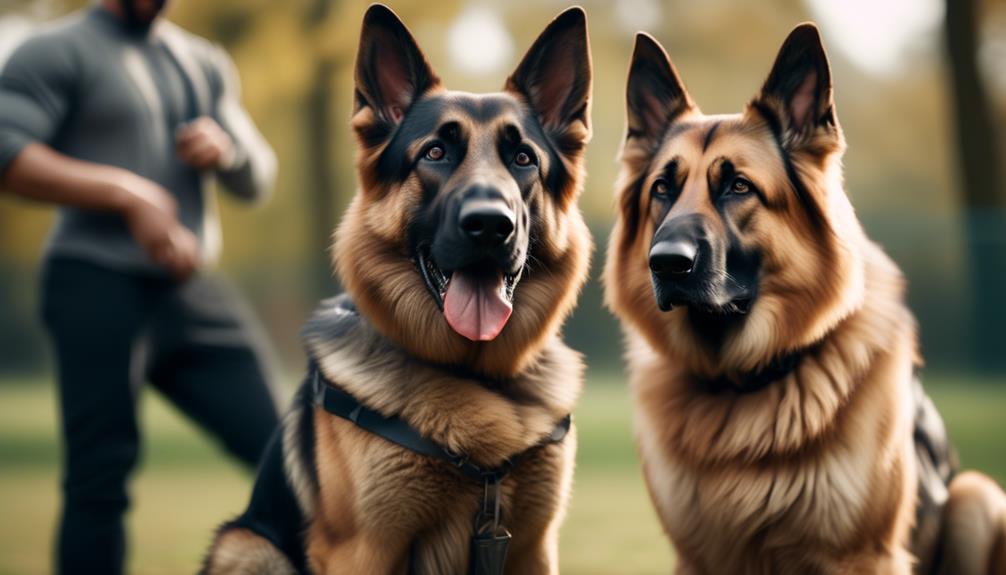
When considering the trainability of German Shepherds and Belgian Shepherds, it's important to examine various factors that contribute to their ability to learn and excel in training activities. Here are some trainability factors to compare between the two breeds:
- Independence and Training:
- German Shepherds are more independent workers compared to Belgian Shepherds, which can make them more stubborn during training.
- German Shepherds prefer learning a variety of new tasks, while Belgian Shepherds thrive on routine.
- Belgian Shepherds are eager to please and seek recognition for a job well done, whereas German Shepherds prefer to do their own thing rather than repetitive tasks.
- Working Dogs:
- Both breeds excel as working dogs, but Belgian Shepherds are more prized for their consistency and willingness to stick with one job.
- German Shepherds can get bored and stubborn compared to Belgian Shepherds, but they're still highly valued for military and police work.
- Belgian Shepherds are preferred for their responsiveness to commands and desire to perform well.
- Health:
- Belgian Shepherds tend to be healthier than German Shepherds, which have a higher risk of various health problems.
- German Shepherds require more costly veterinary care to keep them healthy.
- Overall, Belgian Shepherds are more ideal for police and military work due to their better health.
These trainability factors provide valuable insights into the differences between German Shepherds and Belgian Shepherds, helping prospective owners make an informed decision based on their specific training needs and preferences.
Training Methods for German Shepherds Vs. Belgian Shepherds
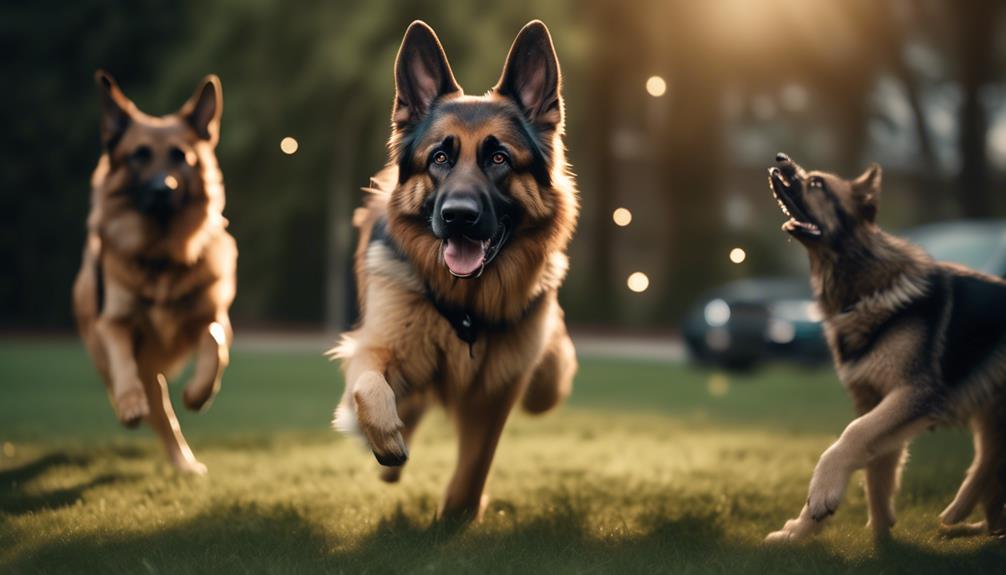
German Shepherds and Belgian Shepherds have distinct characteristics that influence the most effective training methods to utilize for each breed.
When it comes to training German Shepherds, it's essential to understand their high intelligence, strong work ethic, and loyalty. These dogs thrive on mental and physical stimulation, so training methods that engage their minds and provide them with purposeful activities are highly effective. Positive reinforcement techniques, such as using treats, praise, and rewards, work well with German Shepherds. They respond well to consistency, clear communication, and structured training sessions.
On the other hand, Belgian Shepherds are known for their high energy levels, agility, and natural instincts. Due to their strong drive and desire to please their handlers, training methods that involve physical exercises, obedience training, and task-oriented activities are beneficial for them. Belgian Shepherds excel in tasks such as search and rescue, police work, and agility competitions. Positive reinforcement, combined with firm and consistent training, helps channel their energy in a constructive manner.
When comparing the training methods for German Shepherds and Belgian Shepherds, it's important to consider their distinct personalities and characteristics. While German Shepherds require mental stimulation and purposeful activities, Belgian Shepherds thrive on physical exercises and task-oriented training. By understanding and adapting to their unique needs, trainers can effectively harness the trainability of these remarkable breeds and help them reach their full potential.
Training Challenges With German Shepherds Vs. Belgian Shepherds
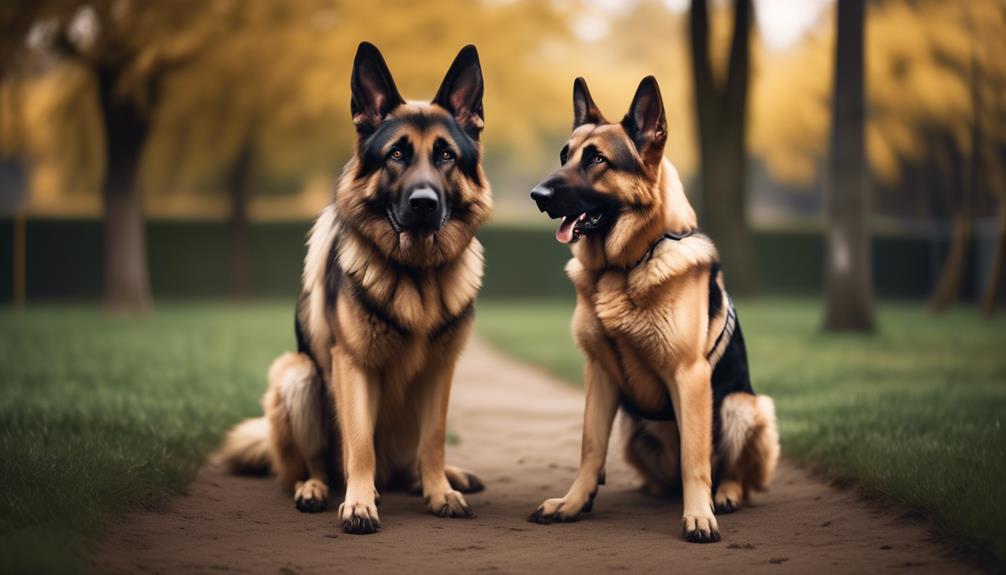
Training challenges can arise when working with these two intelligent and driven shepherd breeds. German Shepherds and Belgian Shepherds are highly trainable, but they've unique characteristics that can present certain challenges in the training process. Here are three key training challenges to consider when working with these breeds:
- High Intelligence: Both German Shepherds and Belgian Shepherds are known for their high intelligence. While this makes them quick to learn and capable of complex tasks, it also means that they can become easily bored. To keep them engaged during training sessions, it's important to provide mental stimulation and vary the exercises frequently.
- Exercise Needs: Being herding breeds, both German Shepherds and Belgian Shepherds have high energy levels and require ample exercise. If their exercise needs aren't met, they may become restless and exhibit behavioral problems. It's crucial to incorporate regular physical exercise into their daily routine to ensure they're mentally and physically satisfied, which will make the training process smoother.
- Focus and Drive: German Shepherds and Belgian Shepherds are often used in police and military work due to their exceptional focus and drive. However, this intense drive can also pose a challenge during training. These breeds can become overly focused on a task, making it difficult to redirect their attention or introduce new commands. Consistency, patience, and positive reinforcement are key when training these breeds, ensuring they stay motivated and responsive.
Choosing the Right Breed for Your Training Goals
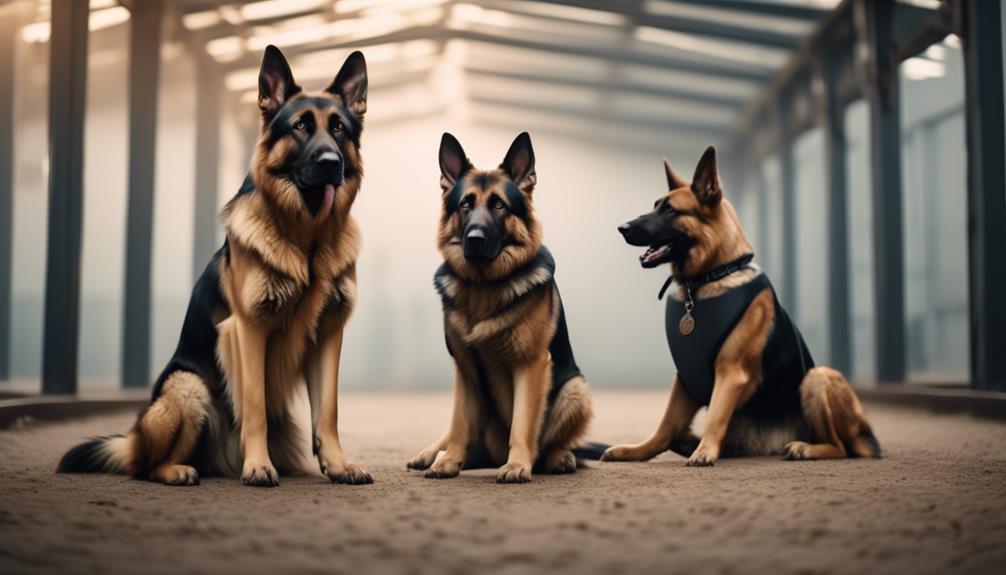
Given the training challenges discussed earlier, it is important to carefully consider your training goals when choosing between German Shepherds and Belgian Shepherds. Both breeds have their own unique characteristics and strengths that can be contextually relevant to your specific training goals. To help you make an informed decision, here is a comparison table highlighting some key differences between the two breeds:
| Training Goals | German Shepherd | Belgian Shepherd |
|---|---|---|
| Independent Work | High | Moderate |
| Eager to Please | Moderate | High |
| Consistency | Moderate | High |
| Veterinary Care | Costly | Moderate |
| Anxiety | Low | High |
If your training goals involve tasks that require independent work, such as search and rescue or guarding, the German Shepherd may be a better choice. On the other hand, if you are looking for a breed that is highly eager to please and excels in consistency, the Belgian Shepherd may be more suitable. It is also important to consider the potential costs of veterinary care, as German Shepherds tend to require more expensive medical attention. Additionally, if you are concerned about anxiety, the Belgian Shepherd may be a breed to approach with caution. By considering these factors and aligning them with your training goals, you can make an informed decision when choosing between German Shepherds and Belgian Shepherds.
Frequently Asked Questions
Are German Shepherds or Belgian Malinois Easier to Train?
German Shepherds are generally easier to train compared to Belgian Malinois. They are known for their trainability, patience, and ability to adapt to various training techniques. Consistency and positive reinforcement are key in their obedience training.
Are Belgian Malinois More Intelligent Than German Shepherds?
Belgian Malinois and German Shepherds possess differing trainability due to variations in intelligence, breed characteristics, problem-solving skills, and learning abilities. Factors such as genetics and training methods also impact their trainability.
Which Dog Is Better German Shepherd or Belgian Shepherd?
The German Shepherd and Belgian Shepherd both have their strengths and weaknesses. When comparing them, factors such as grooming, exercise needs, temperament, health concerns, size and appearance, training methods, socialization needs, energy levels, living arrangements, and compatibility with children and other pets should be considered.
Which Is Better Belgian Malinois and German Shepherd?
Belgian Malinois and German Shepherds both have distinct temperaments, exercise requirements, guarding abilities, breeding standards, and health concerns. They differ in socialization needs, training methods, working capabilities, family friendliness, and compatibility with other pets.









